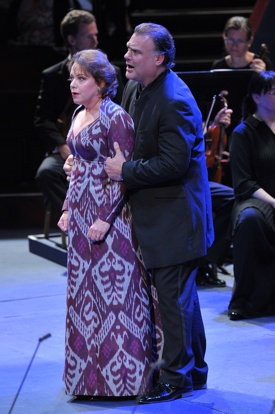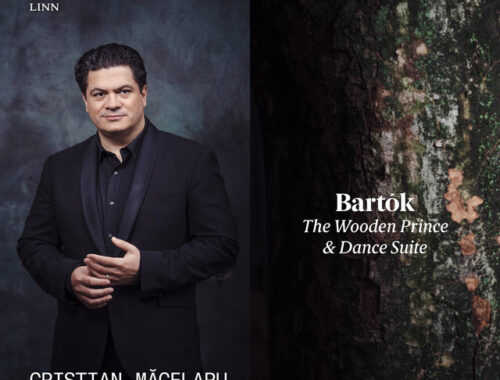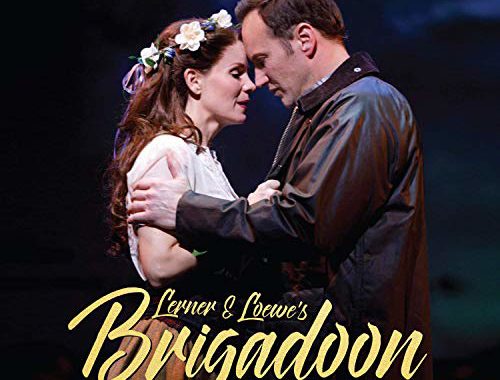Prom 15: Wagner “Die Walküre”, Staatskapelle Berlin, Barenboim, Royal Albert Hall (Review)
 An evening of high drama: a very public altercation between conductor and concert master, a Wagnerian memory lapse from the leading lady, but one of the most thrilling accounts of Die Walküre you will ever hope to hear. Hearing is believing, it is said, but as the static electricity crackled through the Staatskapelle Berlin’s delivery of the stormy prelude, Daniel Barenboim effected a sudden drop-out in dynamics the like of which I could not quite believe – almost as if we had entered the eye of the storm and just for a second or two were physically and mentally becalmed. Hair-raising.
An evening of high drama: a very public altercation between conductor and concert master, a Wagnerian memory lapse from the leading lady, but one of the most thrilling accounts of Die Walküre you will ever hope to hear. Hearing is believing, it is said, but as the static electricity crackled through the Staatskapelle Berlin’s delivery of the stormy prelude, Daniel Barenboim effected a sudden drop-out in dynamics the like of which I could not quite believe – almost as if we had entered the eye of the storm and just for a second or two were physically and mentally becalmed. Hair-raising.
And that miraculous murmur of the storm receding carried through into the first scene where solo cello (dare I be picky about intonation?) gently carried us into the presence of human kind and the first intimations of the Spring of love – “Du bist der Lenz” – momentarily left the arrogance of the gods behind. Barenboim and his orchestra were all warmth and humanity and the first of many wondrous wind solos – shyly in the clarinet – was enough to break your heart. We were but five minutes into the score and Barenboim would conduct this entire first act from memory.
The storytelling in the orchestra was as vivid as the text demanded – alive and articulate with trenchant attacks from the top to bottom of the string section and the richest palette of dynamics imaginable. It was a wonderful foundation on which to build solo performances and all three principals in this act were catapulted to the top of their game. Simon O’Neill’s seasoned Siegmund was in ringingly uninhibited form, his storytelling engaged and involving, the second of his cries of “Wälse! Wälse!” so heroically protracted as to draw the fabled sword from the tree without laying a hand upon it.
He and Anja Kampe’s glorious Sieglinde bonded in every sense, the connection between them impassioned, the alliance of their voices rising from intense to euphoric in the approach to those feverish final moments. Coming between them was Eric Halfvarson’s vocally cavernous Hunding wielding his text and booming bottom notes like a deadly weapon. But the physicality, the rush of incestuous sexual attraction is what this act is all about and there is little in music as orgasmic as the accelerating pulse of the closing bars where the violins’ articulation lifted those rampant semi-quavers off the page as Wagner will have imagined but only dared hope he would hear.
Enter then the great Bryn Terfel’s Wotan – the elemental flip-side of Iain Patterson’s wonderfully suave Rheingold Wotan. We know Terfel’s performance well now but how compellingly he relives and rediscovers the role. His daring, near-whispered, confidences – achieved in chilling mezza voce – draw us to him in even a hall as vast as this and his act two narration began here like a bedtime story for his favourite daughter, Brünnhilde, the marvelous Nina Stemme.
And how tellingly in this performance the great scene between Wotan and Ekaterina Gubanova’s imperious Fricka laid down the terrible dilemma which sees him torn between allegiance to his kind and a hunger for the free will of mortals. Terfel carries that burden, that conflict of interests, right through the second act and beyond, secretly hoping, one feels, that Brünnhilde will defy him and act as he cannot. In the final scene, it is in the moment where he learns that Sieglinde is with child that he at last feels real hope. How wonderfully Terfel conveyed that.
Then there is the passion, the willfulness, of Nina Stemme’s feisty Brünnhilde who has everything and more than the role demands not least quiet singing that is beautiful and thoughtful. The crucial scene with Siegmund – shrouded here in playing of exceptional nobility – was exceptionally moving and at the close of the act where she facilitates Sieglinde’s escape with the precious fragments of the sword Stemme gives the stage to Kampe firing on every cylinder of emotion she can muster to extol the Valkyrie in the soaring “redemption of love” motif.
There is no doubt that Barenboim micro-manages every last detail of these scores and as spontaneous as they sound there are times when one wonders how players and singers feel about being nursed down to the last quaver. Clearly there was some visible friction occurring between Barenboim and his concert master on this occasion though Nina Stemme must have been eternally grateful for the maestro’s close proximity when she briefly went astray in the final scene. Sidling up to the podium she was granted a discreet peek at the score – just as well Barenboim didn’t conduct the whole score from memory.
That final scene was sublime, the orchestral ascent to the last embrace opening out in Barenboim’s super-expansive tempo to a release in overreaching strings and horns that was simply unforgettable. Can this Ring possibly get any better?
Photo: Nina Stemme as Brünnhilde and Bryn Terfel as Wotan in Wagner’s Die Walküre at the BBC Proms
Copyright/Credit: BBC/Chris Christodoulou
You May Also Like

A Conversation With VASILY PETRENKO: On Shostakovich
02/09/2010
GRAMOPHONE Review: Bartok The Wooden Prince & Dance Suite – WDR Sinfonieorchester/Macelaru
24/03/2023
One Comment
Nick Wraight
From the front left arena, Wotan audibly re-cued his daughter (crossing the stage rapidly)rather than the conductor who did, however, twice attempt to unsuccessfully bring in Brunnhilde. Not surprisingly, it took a dozen or so lines of text for the Valkyrie to settle down again. A stunning evening indeed!